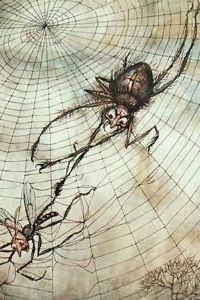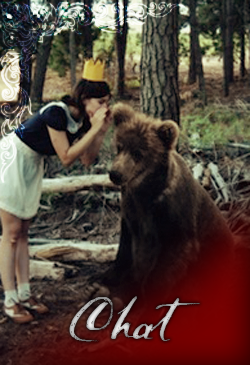Post by WILLIAM WEBB on Jun 29, 2012 21:58:49 GMT -5
...william patrick webb *
* Some men just want to watch the world burn. *
[/size]* Some men just want to watch the world burn. *


...basics*
name William Patrick Webb
nickname He prefers William, but he’ll take Will. Willy, Billy, and Bill are not acceptable and may or may not get you shot.
age 31 or 32. He doesn’t actually remember what year he was born in anymore.
gender Male, clearly.
grade N/A
hometown Edinburgh, Scotland
sexuality Aromantic pansexual.
personification The Spider from “The Spider and the Fly” by Mary Howitt
status AWAKE
face claim Andrew Scott
...appearance*
hair color Naturally black.
eye color An alarmingly dark brown that usually appears black. They have a slightly hollow quality about them.
build Slender and pale.
height 5’9”
clothing style He usually wears nice suits because he can afford him and he likes the way they fit him – also because they look good on him. However, he is a master of disguise and can frequently change his appearance to suit his needs. His clothing style often changes with his persona.
distinctive traits He usually has just a bit of stubble on his chin, and his eyes tend to frighten the bejeezus out of most people.
...personal*
personality
William is a psychopath.
There are no two ways about it. He’s textbook. He has absolutely no empathy towards other human beings – he is incapable of love. His moral code is nonexistent; instead, he follows his own set of rules designed for the playing of his own personal game of life. And that’s what everything is to him: a game. He has devoted his fleeting existence to occupying himself, as interestingly as possible. It’s the only reason he hasn’t killed himself yet.
William has no sense of self-preservation beyond what serves his own purposes. He’s a standard nihilist – he believes that existence and everything in it is inherently meaningless and without value. Of course, personal value can be assigned to things, as William assigns value to his game. However, in regards to material possession, other living things, and even his own body, William simply doesn’t care. The world is his plaything. People are toys. His own body is a vessel to maintain only until his boredom overcomes him so thoroughly that he feels the need to end his existence. For this reason, he is incredibly self-destructive. He regularly sleeps around, does whatever sorts of drugs he feels like doing, and even self-harms when he’s upset and there’s nothing else around to receive the side effects of his rage. He’s a reckless driver because he finds it exciting, and he frequently engages in potentially fatal stunts just because he thinks it might be “a good laugh.” Basically, William is completely insane.
But William’s naturally destructive behavior is not limited to himself, unfortunately. He hates animals – they serve no purpose to him – and will even go so far as to kill them to get them out of his way. And, as aforementioned, William loves to play with people. They are his most interesting playthings; although, at the same time, he finds them painfully boring. (He finds almost everything painfully boring, which is why he spends so much time trying to find something “fun” to do). This is because he has taught himself to read them easily, not because he understands emotions, but because he is an excellent reader of body language, and his cynical views on human nature often seem to hold true. He is a master of manipulation and seduction; he can take a look at a person and know exactly what it will take to get them in his bed or give him what he wants.
But the most interesting people to William are the ones that don’t bend to his will as easily as the rest. William hates not getting what he wants, but, at the same time, he loves not getting what he wants because it means a challenge. Since he lives for challenges, anyone or anything that poses a challenge to him is always, at least initially, a fascinating subject. Similarly, human beings that resist his naturally magnetic charm are usually targets for his uncontrollable lust – for, though he doesn’t love, he wants, more acutely, perhaps, than any other human being on earth. And, like most people, he wants what he can’t have. If it’s hard to get to, he wants it. Of course, once he has it and the honeymoon of his victory wears off, he gets bored again and moves on to the next conquest. He is a cruel man, one who is aware of his own cruelty and simply doesn’t care. Any tendency towards sympathy was erased in him long ago.
William is wickedly intelligent in the worst way. He is nothing short of a criminal mastermind, and, with his ruthless attitude and almost limitless intellect, he has gained control of (or at least contacts in) the international criminal underground. As he likes to put it, he is “the world’s criminal.” He can have a bank in Belgium drained of its finances while he sits in New York City sipping a martini. He can have a politician murdered in Russia while he’s on vacation in Fiji. Needless to say, he is incredibly powerful and incredibly rich – but looking at him, you wouldn’t know it. He uses only as much money on himself as he wants to, which, compared to “normal” people, really isn’t very much; usually, it’s just enough to buy himself some nice suits, good alcohol, exotic drugs, and etc. The rest he usually uses to forward his own motives, whatever they may be at the time. He needs to have puzzles given to him in order to stay engaged, so if you provide him with a problem that needs to be solved (although it isn’t his official business), you’re likely to have him give you a very clever solution. He is also artistically talented, though his style is always very warped in appearance; and, since the awakening of the Spider, he has become very fond of knitting.
As a master of disguise, William uses his talent at reading human needs and reactions to create personas. He has numerous valid identities, whereas his own is not present in any registrars anywhere in the world. Technically, William Webb doesn’t exist – it is only by his fake identities that he manages to appear in any system. Of course, the existence of his identities also fluctuates, depending on their relevance to him. But their existence aside, he is an incredibly convincing actor. He also has an incredibly magnetic presence; people have been increasingly more drawn to him just naturally since the awakening of the Spider. Without even trying, he is compelling and entrancing, with an exceptional talent for suavity.
William knows exactly how smart he is, and he has a great deal of self-confidence because of it. He can come off as a bit arrogant or condescending and almost always smug in some way. However, he is also extremely logical, and he knows that allowing his arrogance to get to him will make him miss something important, which, in his line of work, it is crucial not to do. So, though he is thoroughly self-absorbed and a patent narcissist, he is also incredibly thorough. He does not make assumptions – he checks and double-checks his work, even if it can be tedious.
Prone to violent mood swings, William is highly inconsistent in temperament. He may be happy and cheerful one moment, the next irritable and depressed, the next irrationally angry. As a general rule, cheery and joking is his default mood, but he is certainly more than volatile. He’s even been known to throw violent temper tantrums – for all his radical intelligence and various crimes (some of which he becomes involved in hands-on himself), he really is just a child inside. And, rather like a badly-behaved child, he hates nothing more than someone else trying to tell him what to do.
past
Cameron James McCauley was born in a little hospital in Edinburgh, Scotland. He was the product of an unwanted pregnancy in the McCauley family. They were young – Ross McCauley had married Emma Smith largely out of convenience, because she had more money than he had and because she was (at the time) pregnant with his child. Thus, Cameron came into the world to a nineteen-year-old mother and a twenty-year-old father, neither of whom had a steady of income, and neither of whom particularly wanted a child.
For that reason, both Emma and Ross had little tolerance for their son. He was just a drain on their already very limited funds. They yelled at him when he cried, they didn’t play with him save for when it was convenient, they ignored him when he cried out for their attention. Cameron, being an unusually smart baby, soon learned that crying and yelling were really of no use at all, and so he became an eerily quiet child. This garnered him significantly more attention from his mother.
As the boy grew, his intelligence became more and more obvious. At first, his parents thought he might be mentally deficient; he didn’t speak until he was nearly two. But when he did start speaking, he did so in complete sentences, from the moment he opened his mouth for the first time and asked, “Mommy, can I have juice?” He could read on his own by two and a half, and by five was reading the news every morning when his father was done with it, devouring books without pictures and beginning to delve into philosophy.
He was a genius. Without a doubt, he was a genius. There was no other word to describe the intellect of the child.
But with such intelligence came numerous behavioral problems. Cameron was a moody child. He hated not getting what he wanted and he was not beyond throwing fits, ignoring authority figures, or skipping class to try to get what he wanted. For a child, he was incredibly manipulative. He cried a lot, occasionally threatened teachers, and wreaked general havoc, all simply because he didn’t want to be bored. Cameron was always bored. He was several grade levels ahead of the rest of his class by the time he started school, and the teachers simply didn’t know what to do with him.
Neither did the McCauleys.
As their unwanted son grew and gradually became exceedingly more troublesome, his parents started to respond negatively. They had, of course, never been particularly nice to Cameron – they never complimented him or asked him how he was, just told him to be quiet and stay out of their way. But it was around that time that the abuse started.
It would start with a slap or a spank or an angry reprimand, but by the time William was five or six, it was severe. His parents were both uneducated, cruel, and exceedingly stupid; they didn’t understand what Cameron needed and they didn’t care. They didn’t ask to have him, as they reminded him often, and if they weren’t so against abortion, he would not have been born at all. His mother was the one who reminded him of this the most often, that he was worthless, more trouble than he could ever be worth, meaningless. She emasculated him from the beginning and made him work to earn his keep.
Ross, on the other hand, was possibly worse. Not only was he verbally cruel to the boy, but he beat him – badly, and at least several times a week. Sometimes it would be as simple as a kick in the bum, but as Cameron got older and started fighting back, it would get worse. Sometimes, he was thrown down the stairs. Sometimes, he was locked in a closet for hours on end. And sometimes, his father did worse.
Sometimes, he came into Cameron’s bed at night.
It wasn’t every night. It was just sometimes, when his father was very drunk or very angry or just particularly sick. He would rouse his undernourished, skinny, pale son in the middle of the night and he would do things to him that a father should never do to his child.
Often, Cameron would take the next day sick off of school, usually because it was difficult for him to walk. And his father, on those days, usually let him. Usually.
His mother said nothing about it.
By the time Cameron was eight or nine, he had shut himself down. He would come into school with a black eye and a smile on his face and say nothing about it. He would stash knives in his locker and kill small animals on the playground so he could dissect them. Once, he took apart the neighbor’s cat. He wasn’t ever caught for that one.
The boy was cold by then. The tendencies that had shone through in his childhood had been fostered into full psychopathy by years of abuse. He’d shut himself down because the world was painful, because feeling was painful. He didn’t want to feel pain or anger or sadness or hurt, so he shut it down. He shut it all down and he became icy and unforgiving. He became what the world wanted him to be: a killer.
School was not much better than home for Cameron. Besides being socially inept and virtually incapable of interacting with his teachers or peers, he was also arrogant and outspoken when he found a problem with another student or teacher. The worst part was that he was always right. This just made the other students loathe him more – the fact that he was brilliant and yet so cruel. And since Cameron was such a short and slender boy, it was very easy to knock him around or throw him into lockers. He was tortured on a daily basis at school, but this, too, was shut out. He didn’t ask for help from the teachers, and the ones that worried about him enough to get close to him found him unreceptive to their offers to help him. He went through the public school system unnoticed.
At the age of eleven, he joined a gang, hoping that perhaps there, just once, they might give him attention. He ran errands and delivered messages for the head of the mob, but he found, after a year in his service, that the boss cared just as little about him as the rest of the world did. That was his very last attempt to reach out to people out of sheer want of companionship.
By fifteen, Cameron was a full-blown psychopath. He no longer cried. He killed neighborhood animals on occasion and kept knives and explosives in his room. Sometimes he would smile. He came into school bearing the marks of his abuse on a daily basis and smiling all the way through them, as if they didn’t matter – the only sign that it affected him at all was the way he would flinch away from touch of any kind.
He was determined to make something of himself by that time. Something, anything, to alleviate his insanely strong boredom. He’d tried to kill himself eight times by the time he was fifteen. Each time, he’d either been unsuccessful and just ended up in the hospital, or someone had stopped him or interrupted him before he got the chance to finish the job. So he decided to power through the rest of his schooling as quickly as possible; the only reason he hadn’t run away from that point was so he could finish it, after all, despite the fact that he was hardly ever in class. He devoured his college curriculum and moved on to university at seventeen. With his surprisingly good grades and a little bit of manipulation (he was already building his web of contacts even then), he got himself into Cambridge.
So he went to Cambridge, and he absolutely tore the place to pieces. His scores were incredible – higher than anything anyone could have imagined him achieving at his shitty little public school in Scotland. He was brilliant at every field of study he tried, and he tried them all, picking up languages, deciphering complex mathematical occasions, memorizing historical details and drawing connections between them. And when he was finished, he went back to his hometown outside of Edinburgh and he killed the two people who had made his life horrible. After all, now that he was through school, he didn’t need his parents anymore.
That was the day the Spider awoke in him, the gentleman’s voice soothing him in his head, the sudden awareness of himself, of his real self, of his calling. The Spider did not manifest in any serious way. It took the shape of his shadow when it wanted to speak to him, his human silhouette on the wall morphing into the distended form of the arachnid. And the Spider reassured him that it was over now. He was free of all limitations. He had a web to weave, he had flies to catch, and never again could he allow himself to be ensnared by another human being. Under the influence of the Spider’s advice, Cameron McCauley changed his name to William Webb, a suiting name for a spider.
There were a few other perks, too, like the poison he could now produce at will from the roof of his mouth. There was no Spiderman web-shooting involved, but he did notice the way his reflexes became faster after that day, his hands nimbler, his actions quicker. And he took up knitting. Just a side-effect, he supposed.
After that, he threw himself into the alleviation of his boredom. He did anything. He did everything. He started puzzling out crimes for fun, figuring out how he could rob banks unseen, murder diplomats unheard. And slowly, very slowly, with the new magnetism the Spider’s influence seemed to lend him and his now superhuman abilities, he laid a trap for the world.
He acquired contacts. He pandered, he threatened, he manipulated. He made himself out to be a prince, a businessman, a homeless boy, anything, everything. Slowly, very slowly, he brought people under his control. He spent years of his life weaving his web, ensnaring victim after victim. Already as well-educated as he was, it didn’t take long for him to make himself into a master hacker. Almost instantly, he was bringing governments to their knees with a few lines of computer code, springing the locks on bank security systems from hundreds of miles away, acquiring classified military secrets and held them for ransom. He became very rich and very powerful very quickly. And he was never, ever caught.
After all, spiders don’t have fingerprints.
present
Nowadays, William all but rules the world.
He is in control of almost everything. With just a few lines of code, he can do nearly anything he wants. He sets up challenges for himself to keep himself occupied. He finds victims and targets and he keeps going, keeps changing his schedules and his locations to make things interesting – but, for the moment, he’s settled in New York. He sits in the center of his web in haughty silence, and he can feel every twitch and vibration of every thread. That one man runs a business as powerful and far-reaching as his at such a young age is almost unbelievable, but his enormous mind can handle it.
Of course, just from being himself, William has a significant amount of political influence just through what he can do with threats and his unique hacking talents. But that hasn’t been enough for him lately. He’s wanted a little something else, and, to do so, he’s crafted himself a persona named Richard Allen and taken a specific interest in one politician named David Winters.
family
Ross McCauley – father, deceased
Emma McCauley – mother, deceased
likes
Toying with people
Well-tailored suits
Spiders (obviously)
Recreational drugs
Classical music
Really almost any music he can groove to
Fountain pens
Getting his way
Nighttime
Knitting (oddly)
His artwork
Puzzles, riddles, and complicated thinking games
dislikes
Boredom
Money, despite its usefulness
Country music
Emotions
Boredom
Families
Vulnerability
Boredom
Not getting his way
Most animals
Intimacy
Children
Boredom
Boredom
Boredom
other notes His natural accent is a very thick, lower class Scottish accent. He trained it up to something coherent and refined, but he can also do almost any other kind of accent at will, depending on the persona, be it American, English, Australian, Irish, Russian, German, or anything else. He can do them all.
...literature*
book title “The Spider and the Fly” by Mary Howitt
backstory
There’s a very clever spider who’s trying to get this fly into his house so he can eat her. He offers her all sorts of goodies, a bed in his house, a place to sit in his parlour, but the fly knows better – she knows that the spider is trying to lure her in with presents so he can eat her. She refuses him time and again, and then finally leaves.
The spider then gets a very clever idea. He gets his table ready to chow down on the fly, comes to his door, and starts calling to her, complimenting the fly’s beauty – her wings, her eyes, her clothes, etc. The fly, entranced by his flattery, flits over to him, and the spider grabs her and finally gets his dinner.
...roleplayer*
name Zelda!













